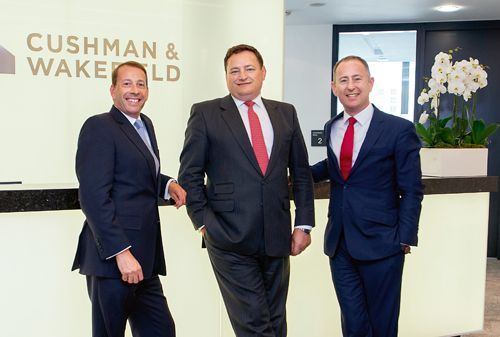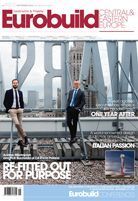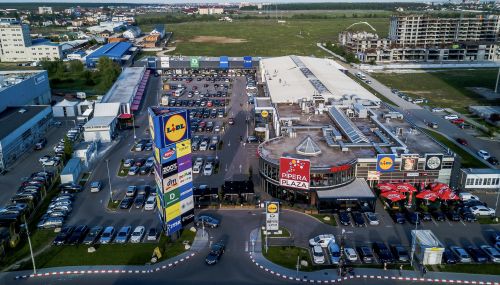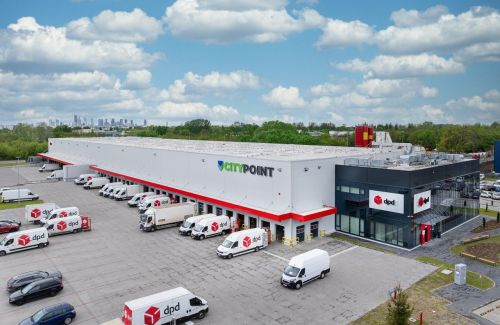One year after
Feature
Nathan North, Eurobuild CEE: Is the merger process now complete – or is there more work to be done in certain areas?
John Forrester, EMEA chief executive, C&W: We are a client-reflective company. Clients are growing: there are now many more clients in more geographies and sectors bundling together their needs. They want to simplify their purchasing models and we would like to be their partner in all the appropriate skills and sectors that we can, as this is driving the consolidation in our industry. There are generally two sorts of clients: global corporate clients who may need two companies to work with; and then there are the investors who insist on having the best person.
Jonathan Hallett, head of CEE region, C&W: There has also been a continued but significant shift in capital across the EMEA from locally-based investors to foreign capital entering new markets.
Charles Taylor, head of Poland, C&W: So we have to ensure that our global reach is absolutely huge, especially in markets like Poland, which is attracting investment from everywhere. Global reach is absolutely the key.
JF: Our strategy, however, is not to be the absolute biggest, but the best. To retain and attract the best talent on the market. Bringing two firms together isn’t just a matter of bringing together two teams of people in each city. There are different HR rules to abide by in each place. Client-facing teams around the world are co-located and are working together. This is an incredible fit with 43,000 colleagues.
JH: In this part of the world, in Slovakia we have combined two offices into one in Bratislava’s Eurovea complex. In Hungary we did the same with our office on Fashion Street, while in Prague we relocated to a new office in Quadrio. In Poland, however, due to the scale we have co-located teams in both existing locations.
Has there been any change in strategy or emphasis – or is it more a case of the merged company expanding the range of its competences and maintaining both of them?
JF: From a client perspective the merger is complete. We had an ambitious schedule in bringing the two firms together. In almost every major city in the world, both teams operated. And then there are things like entity structures – separate companies within a country. In some countries, the merger process can be very quick, but in others it can take years. But that does not stop us operating as a single company in front of our clients, as one team. Our first priority was to merge the businesses that we owned, but all our affiliates and alliance partners have to be taken into account. Across the EMEA we have a wholly owned presence in around 20 countries and we have extended our delivery of services into a similar number of markets through our affiliate relationships. If there are two affiliates in one country, the task is choosing the right platform for our clients. As we’ve already announced, in Africa, one of our biggest growth markets, Excellerate Property Services has entered into an affiliate agreement with us to create our sub-Saharan platform, Cushman & Wakefield Excellerate, which will have 32 offices in 11 countries. So there is still a lot to do for our management teams – all our energies are now being directed into where we take the business forward and how to be the best partner. We have gained substantial business around the world. From the data for London you can see that we are now a solid top-three player. A year after the merger, in H1 we were the number one in leasing and in capital markets. While there has been an incremental increase in business, we have scaled down a little on our team sizes, because of the efficiency of the merger. So with a slightly smaller team we are doing more business and work than last year, as the number one player. This is also happening to us in many of the world’s other leading markets.
JH: It is the capabilities of what the platform now brings us that puts us in a different place – not just in our clients’ eyes, but also in our eyes.
JF: Our merger is complete at a time when the impact of technology is beginning to accelerate within all professional services environments, not just real estate. The next phase of change for us will be our investment in technological infrastructure and in how we provide the most efficient services to our clients. There has been an organic move to provide the same level of quality in every location throughout the world. So we must employ the latest technology and set up a very visible internal organisation to deliver that level of client service. By revenue we are now one of the world’s three largest full-service real estate advisers. But it’s how we deliver our services that is the key – how we focus all our energies to make sure our teams use the technology to cooperate with each other around the world. A company such as Blackstone, for example, might invest in offices one day, hotels on another and in student housing the next – so we need to be able to move seamlessly between those asset classes.
Where has the merger left C&W in terms of market position and global reach?
JF: We are now dominant in China and the number one in Australasia, New York and London. We have a great business in Warsaw and across the CEE region. We are in a wonderful position to deliver to our clients a consistency of service across the world. We’ve done something incredible that we haven’t done before – but that doesn’t mean anything unless we do something with it. Everyone wants to know what you want to do next. We are doing a lot today that we were not able to do before. That’s the result of the merger.
JH: The expertise in sectors such as healthcare or student accommodation has dramatically changed. You might find certain expertise locally, but you are now able to connect them with the network to give you the advice and support. And people like John are dropping in every day. They come to the region to support us.
JF: What we are now able to give is an opportunity for bright young people in each of the skill lines who, for instance, may not yet decide whether to work in Beijing or Sydney or London. We provide these opportunities in all of those cities and many, many more.
CT: We now have a coordinated graduate training programme for Europe – one year you could be in Warsaw, another in Brussels.
Since I am speaking to three British executives, we should move onto one of the big issues of the moment: Brexit. To what extent is the uncertainty generated by the vote still continuing? Has it abated at all – or is it set to carry on into the long term?
JF: Brexit is definitely a factor for any investor or occupier looking at the UK and Europe on a multi-dimensional level. If you are simply a domestic UK investor, then there is no issue. But it’s a different picture for multi-national investors. The 2015 data suggeststhat it was a top of cycle year for the UK – and after 5–6 years of growing volumes and prices there usually is a bottoming-out. In the six months leading up to the Brexit vote, there had already been a drop in UK investment levels. And this was not purely down to the impending vote, since at the time Continental assets seemed more attractive. Now the uncertainty is not about the outcome of the vote, but about when Brexit will happen. Approximately 16 pct of UK deals that were in the market at the time of the EU referendum have not proceeded. However, unlike in the aftermath of the Lehman collapse, the market has not stopped for twelve months. I would liken European real estate to a balloon: the UK has squeezed it in the middle, but it has expanded elsewhere, such as in Poland, the Czech Republic and especially in Germany. There hasn’t been any reduction in the amount of money focused on European investment, and corporates are still seeking to grow their business, but we may be seeing the change in their behaviours created by the uncertainty of Brexit. So it is better to say that there has been a slight softening of a top of the cycle market as opposed to anything more substantial.
So it hasn’t repressed the number of major trans-national property acquisitions/leases or corporate acquisitions between UK and
EU companies?
JH: In the UK it’s going to be hard to beat the volumes of 2015, but it’s a different story in the CEE region and much of Europe.
CT: Yes, in our region there has been no discernable impact on pricing and volumes.
JH: Certainly the situation in the EU is incomparable to that of Russia, where there was a significant slowdown in EMEA or US led capital deals, leading to a fall in investment volumes, due to the sanctions.
JF: In fact, a terrorist attack, such as the one in Brussels, can have a much bigger impact on the local real estate market than a vote to be part of the EU. In a world which is facing uncertainties every day, Brexit is actually just another uncertainty.
How are the global funds and investors reacting? Could Poland and the CEE region benefit from a switch away from investment in Britain?
CT: For them, Brexit is just another risk. Like in Poland when the new government was elected last year, it has merely prompted investors to take a step back, take stock and reflect on the macro-economic data more closely for a few weeks. Then they say to themselves: I’ve considered the risk and I still want to invest the shareholders’ money here. This is exactly where the CEE region could benefit, through the diversification of risk.
JF: Others look at it as an opportunity. The dollar denominated investor interest in the UK has grown substantially since the currency changes post the vote. We’ve been having the highest number of new enquiries from Arab states.
JH: And for the first time we’ve had some major CEE players who may have normally invested at home but are now looking at investing in the UK.
JF: Localised events such as Brexit have been happening regularly in Europe for the last few years – and Europe is the most complex market in the world, so clients need the very best advice. The business is experiencing daily changes. One issue for financial services is over passporting: will UK-based companies be able to operate freely in the EU – and vice versa? If yes, then London will remain as a dominant global financial services hub.
Which real estate sectors across Europe apart from investment might be impacted or benefit the most?
CT: Well, Poland will pick up business because it is a market with a strong tradition of outsourcing of expertise. We have many banks and financial institutions represented here. We are starting to see a greater level of enquiries, primarily from those companies that have already relocated but are now wanting to explore whether they can take more space to take additional functions and also using the opportunity to drive further cost savings within their business.
JH: Central Europe is an outsourcing hub for Western Europe. Language abilities here are better than in China or India, for example. So there is a big focus in terms of education these days to create additional skills for people in our markets.
CT: And it’s not just the office or back office sectors. Manufacturers want to be embedded in what are now primary markets for them. So we are receiving enquiries from UK firms for BTS projects in Poland. They are mainly looking at the labour pool and the access to markets.
JH: But in terms of retail and warehousing, technology is having a far greater impact than such events. Technology is transforming our business far quicker than any material events that happen.
JF: That’s a very good point. Technology, such as artificial intelligence and automation, is now doing the work that humans once did – or it is being done by someone somewhere else in the world. And Poland is a hub market for such outsourcing. Overall, we less engaged by short term issues and more concerned about being a catalyst in how these changes take place.
The numbers after the merger
Cushman & Wakefield now has 43,000 employees in more than 60 countries, with 5,000 of these employed in 40 EMEA countries. The group currently generates revenue of USD 5 bln from its core services of agency leasing, asset services, capital markets, facility services (C&W Services), global occupier services, investment and asset management (DTZ Investors), project and development services, tenant representation, and valuation and advisory. Its EMEA clients include nine of Forbes’ top twenty global brands and 82 pct of the top fifty cross-border investors.






















































